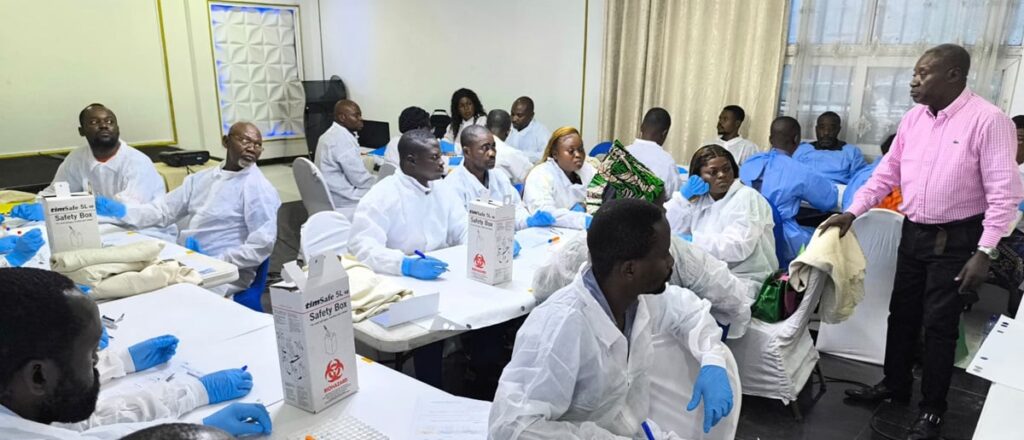
As mpox cases surge across parts of Central Africa, the Democratic Republic of the Congo (DRC) is at the forefront of a pioneering public health response. The nation is integrating HIV and syphilis testing within its national mpox management framework, an initiative backed by the World Health Organization (WHO). This comprehensive approach, spearheaded by the Ministry of Health with WHO’s technical support, aims to enhance care, minimize missed diagnoses, and bolster community health protection. Clinicians at mpox testing sites have expressed strong support for the initiative.
Evidence increasingly indicates that individuals with undiagnosed HIV or those not virally suppressed are at heightened risk of severe mpox illness and mortality. Additionally, co-infection with syphilis has been observed among those affected by mpox, particularly within key populations. Despite the existence of cost-effective treatments, syphilis remains underdiagnosed and untreated, especially in low-resource settings, making it the second leading cause of stillbirth worldwide. By integrating syphilis screening into the mpox response, the DRC is addressing significant gaps in maternal and newborn health while strengthening broader efforts in sexually transmitted infection (STI) surveillance and care.
“We now know people with HIV, particularly those with a CD4 count under 200 cells/mm³, are at risk for severe disease and death from mpox,” said Dr. Meg Doherty, Director of WHO’s Global HIV, Hepatitis and STI Programmes. “Ensuring early access to HIV and syphilis testing and treatment to all people with confirmed or suspected mpox, as well as timely access to mpox vaccines and antivirals, will save lives.”
Implementation in Kinshasa
In April 2025, the DRC became the first country to implement WHO’s Standard Operating Procedure (SOP) for integrating HIV and syphilis testing services within the mpox response. With WHO’s support, health workers received training and commenced the deployment of dual HIV/syphilis rapid diagnostic tests to enhance detection among suspected mpox cases at designated treatment centers.
The initiative initially launched in five mpox treatment centers and has since expanded to cover 11 health zones. Between April 2025 and June 7, 2025, 697 individuals with suspected mpox were tested for HIV and syphilis. The results revealed:
- 36 individuals (5%) tested positive for HIV, including 27 confirmed mpox co-infections.
- 6 individuals (1%) tested positive for syphilis and received on-site treatment.
- Weekly testing volumes increased steadily, reaching over 120 tests per week.
National Coordination and Scale-Up
The approach is now set for national expansion. On June 3, 2025, the National HIV/AIDS Control Programme, alongside WHO, the Ministry of Health, the Centre d’opérations d’urgence de santé publique (COUSP), and the Divisions provinciales de la santé (DPS), reviewed progress and established priorities for broadening this integrated approach. Key actions include:
- Drafting a therapeutic protocol for managing HIV/mpox co-infection.
- Enhancing capacity at the Kinoise Mpox Treatment Centre.
- Integrating mpox services into six HIV care and treatment centers.
- Strengthening inter-programme coordination to address delays and optimize resources.
- Preparing for geographic expansion to provinces with high mpox transmission or high HIV prevalence.
Addressing Real-World Challenges
Despite significant progress, the rollout faces logistical and operational challenges, including stock-outs, expiration of HIV test kits, and delays in mpox PCR test results, impacting timely treatment. Additionally, there is limited capacity to manage severe mpox/HIV co-infections, with only one advanced care site (MSF Kabinda in Kinshasa) currently operational.
Looking Ahead
As the DRC continues to tackle multiple health threats, including mpox, HIV, and syphilis, its integrated testing model provides a blueprint for action in resource-limited settings. Lessons learned from this initiative can be applied in neighboring countries as part of emergency and outbreak responses, as well as for future health preparedness and planning.
WHO and the DRC plan to continue joint supervision and mentoring visits to strengthen data reporting, monitoring, and improve stock management to prevent future shortages. Both entities remain committed to protecting and saving lives by linking outbreak response with essential HIV and STI services, ensuring no one is left behind.





